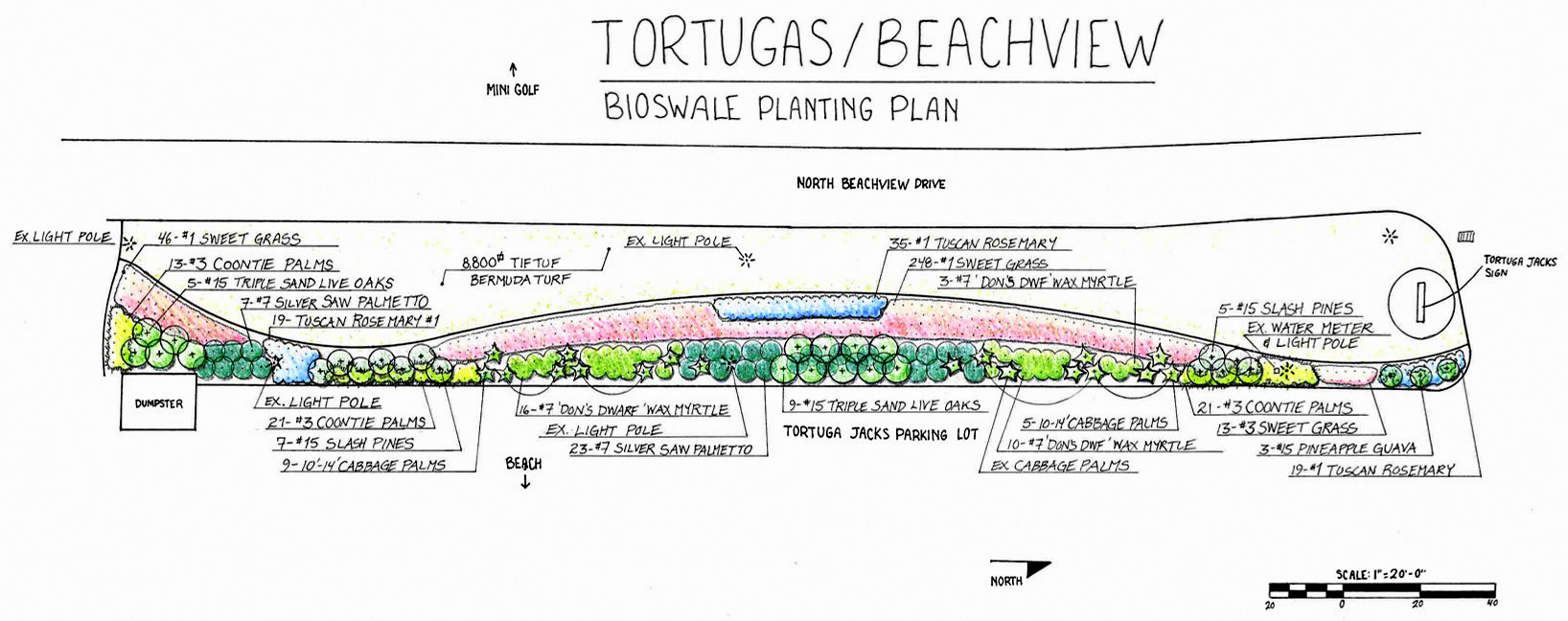by Cliff Gawron, JIA Director of Landscape and Planning
Picture yourself in one of Jekyll Island’s most recognizable spaces, where North Beachview Drive passes the historic mini-golf course near the intersection with Shell Road. This area falls in the middle of a zone of beachfront that provides parking, facilities, and access for Jekyll’s most visited beaches. To the north and south of this point, most of the parking areas and park spaces have been re-designed and beautified with predominantly native plant landscaping over the past 15 years as Jekyll Island has been revitalized.
One glaring exception, however, has been the public parking lot adjacent to Tortuga Jacks restaurant, directly across Beachview Drive from Jekyll Island Mini Golf. The existing parking lot is in full view for passing drivers with no screening vegetation. The existing strip of land that separates the parking lot from Beachview Drive is a relatively flat expanse of scraggly Bahia grass, weeds, and just a few cabbage palms. In addition to being a bit of an eye sore by comparison with the rest of Jekyll’s beachfront landscaping, the site has a functional problem as well. On Jekyll, the old adage “when it rains it pours” is often quite literally the case. And when it’s pouring, the vast majority of stormwater runoff from the south side of the Tortuga Jacks restaurant and the parking lot has no catchment and flows across Beachview Drive right into the mini golf facility where the water itself can cause problems along with the debris it carries with it.
Fortunately, the Jekyll Island Foundation partnering with the Jekyll Island Authority to put donor support to work, is a proven recipe for problem solving. To address this particular problem, a landscape architecture intern from the University of Georgia, worked alongside the Jekyll Island Authority’s Director of Landscape and Planning to create a stormwater detention “bioswale” and planting plan. The design will address the storm water runoff disfunction by re-grading the area to create a swale that will be partially planted with a mix of predominately native tree, shrub, and grass species to aesthetically complement the landscape design of the adjacent Great Dunes Beach Park. Fresh turf will be brought in for the road shoulder to maintain open sight lines for traffic safety and to serve as the aesthetic foreground framing the plantings behind. Once the installation matures, the parking lot will become hidden behind a “green screen” of lush vegetation. A meandering strip of sweetgrass, an iconic native coastal grass, will be a highlight and will make for a dramatic display of misty pink seed heads come late October.
The bioswale will occupy nearly 20% of the total drainage area, large enough to capture all the runoff from the parking lot in all but the most intense downpours. During a rainstorm, the feature will initially fill with storm water, creating a temporary shallow pond which will percolate through the plants, roots, and sandy soils to return to the groundwater table.
This project is set to break ground this Fall after generous support from Foundation donors. Learn more about future Foundation initiatives like this one that you can be a part of supporting: https://jekyllislandfoundation.org/give/initiatives/
